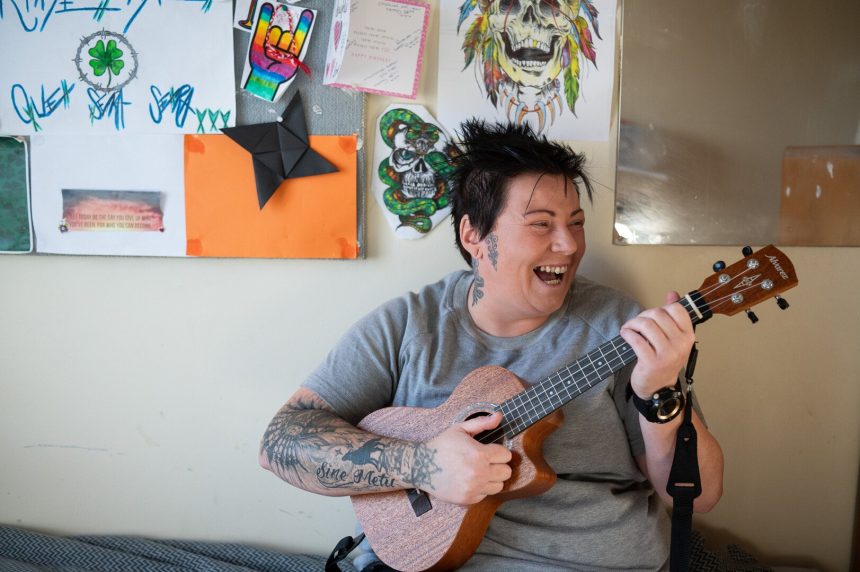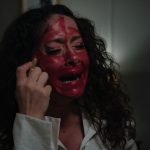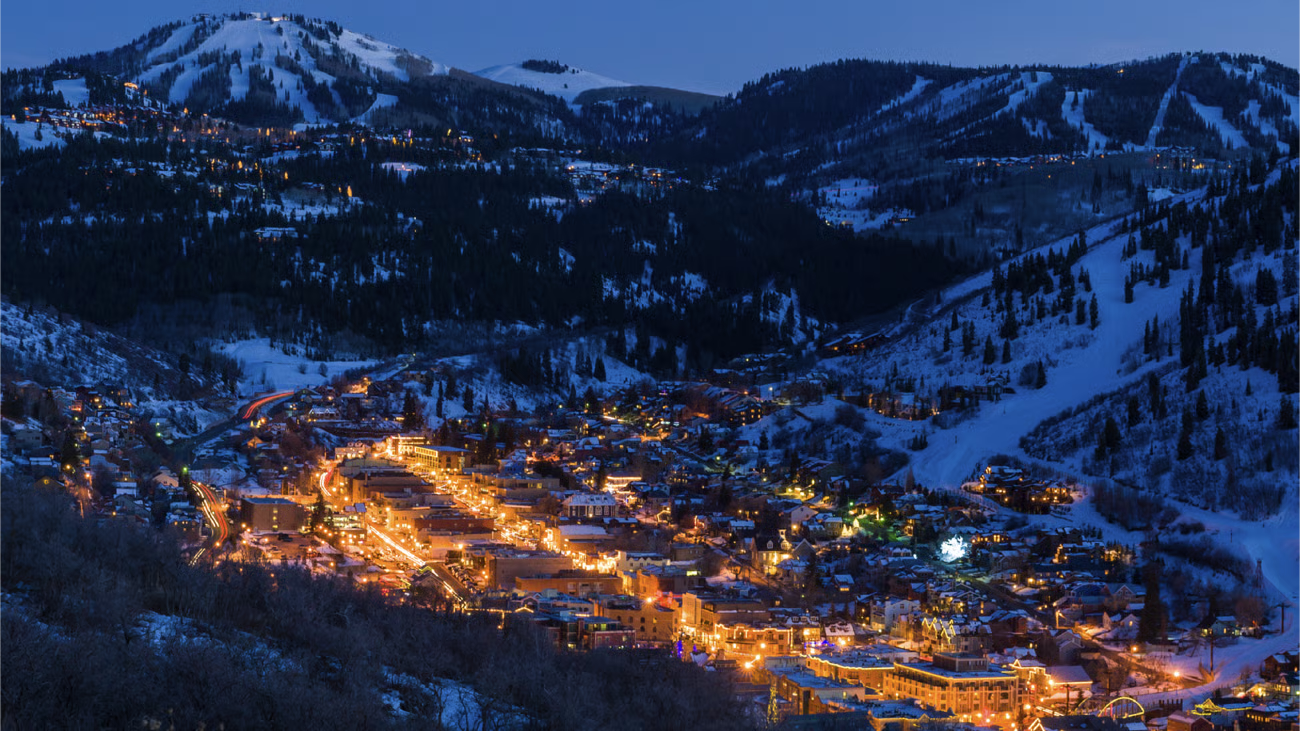Take a few women in prison, some ukuleles, a master song teacher, and a camera, and you have the kind of documentary that documentaries were made for.
In 2o23, Shalom Almond filmed the workshops that the artist Nancy Bates was running in the Adelaide Women’s Prison. We watch the group coalesce around the idea that they could be musicians, and travel with them as they ride the hectic wave that is time inside. Needless to say its not an easy ride, and the film captures the anguish, heartbreak, stoicism and the laughs that make up the days of the prisoners lives.
Nancy Bates is inspirational in the way she makes all of the women feel like they can be songwriters, and the tracks they create are already good, but when the Adelaide Symphony Orchestra gets involved, the whole pitch is taken to the next level.
The ticking clock of a concert that will be held in the prison grounds with the whole orchestra adds not only a big driver to get things right, but creates heart- wrenching moments for those who might not be able to perform on the day- some because they’re getting released and don’t know what’s happening to them next, and some because the cat-and-mouse game of drug use inside is catching up with them.

Directed And Filmed By Shalom Almond
Produced By Katrina Lucas, Lauren Drewery, Shalom Almond
Co-Producer Nancy Bates
Edited By David Scarborough
Score Composer Amanda Brown
Screening at Sydney Film Festival 2025
World Premiered at Adelaide Film Festival 2024.
Starring the prisoners and staff of Adelaide Women’s Prison and members of the Adelaide Symphony Orchestra
AWP Song Birds: Nancy Bates, Clancy, Donna, Erin ,Fabiann, Jeanine, Khe-Sanh, Laticia, Malise, Noelene, Simone, Tamiah, Tina.
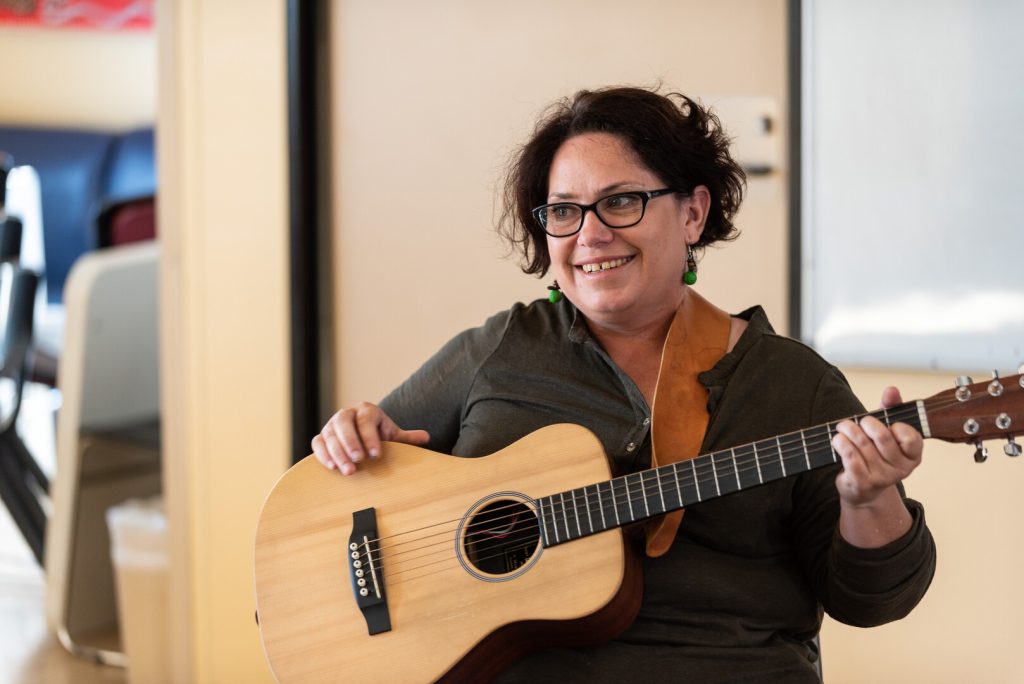
It’s a credit to the prison and Correctional Services that the whole project was able to happen, especially getting an orchestra into a prison at the end. Its a life- changing event for those who were there, and a life- affirming moment for those who watch the film. It’s not just about entertainment however, and the film is part of a much bigger advocacy project that aims to effect real change in the lives of women who leave prison. Jobs, housing, safety, support, domestic violence, addictions, and just not having enough friends, are the issues that plague prison leavers lives, and end up with them either falling back into the justice system unintentionally, or choosing to go back inside because life there is better.
We caught up with Shalom Almond about how she made this incredible documentary, and the hopes that it can affect lasting change.
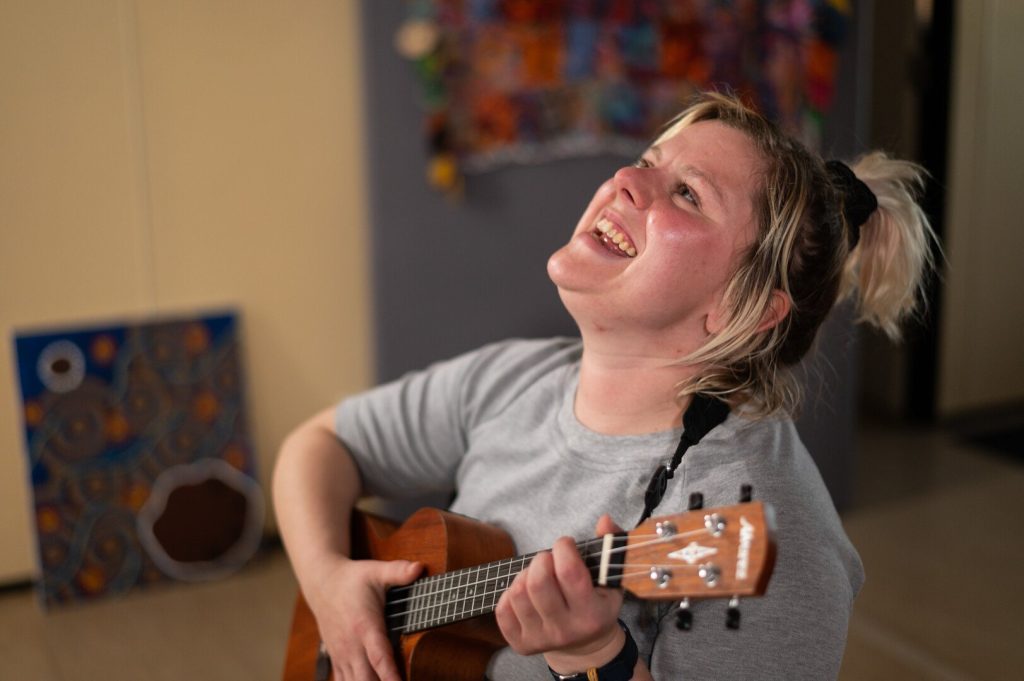
Nancy Bates is incredible in the film. Tell us how you connected with her to get it made?
Shalom Almond: Back in 2007, I had the opportunity to go into the Adelaide Women’s Prison to make a documentary about women rehabilitating retired racing greyhound dogs. And at that time, unbeknown to me, Nancy Bates was also in the prison, teaching, singing and songwriting with First Nations prisoners. We’d heard about each other’s work, but it wasn’t until a year later that our paths crossed on the outside that we connected.
We both had such intensely emotional experiences working in the prison, but also by continuing relationships with some of the women we met in there. Nancy was so keen and excited to go back into the prison to do more work, and I felt like I had just scratched the surface with the first film in terms of giving women inside a voice.
We hatched a plan to create a project together about the power of music and healing, about women inside, and about transitioning to community again. It was nearly five years in the making.
Did you know any of the prisoners from your previous film as it was in the same prison?
SA: They still do have the dog program in the prison – that has been running for a long period of time, but coming in for this project, I didn’t know any of the women beforehand. It’s very much like a revolving door. Part of the challenge of this project was trying to retain a core group of women for even six months without them getting sent to a different part of the prison, getting out of jail, coming in on remand. There’s so much transition.
How many of you were in the prison filming?
SA: Nancy’s program ran two days a week, so on those days it was myself and one other cinematographer who came in. Outside of that, it was just me on my own there, five days a week, nine hour days for nearly eight months. The nature of the kinds of films that I typically take on; small, intimate, personal kind of stories, it does work well to just have myself there with the camera, to create trust and intimacy with the participants.

Tell us a bit more about Nancy Bates, she’s such a talented musician.
SA: She’s a dream to work with. Nancy’s had like a long career in terms of going into prisons. She actually first spent time in prisons when she was under the mentorship of Archie Roach. She was touring with him for many, many years. When she started to go into prisons independently, it was actually to teach stand- up comedy. So as well as being a beautiful, soulful, singer- songwriter, who has incredibly high emotional intelligence and is able to connect with women in that space so well, she is also hilarious. Humour is such a big part of being able to do time well, because if you can’t have a laugh or make light of a situation, it’s a very, very dismal place to be.
Nancy’s ability to be able to open people up and feel that they can share and be vulnerable in a safe space, and also make people laugh and feel joyful and forget that they might be in prison for a couple of hours, is one of her true gifts.
If you go and see one of her gigs, you’re in stitches in between the sets. She keeps her audience entertained so well.
Was this music project a one-off for the film or will it carry on?
SA: It was the third time that Nancy had been in to do a music workshop series in the prison. Because of her success and the incredible collaboration that we formed with the Adelaide Symphony Orchestra, the prison are keen to continue working with Nancy and have her continue to come in. Similarly, the Adelaide Symphony orchestra were just so blown away by their experience that they have committed to having an ongoing relationship with women inside.
There will hopefully be recordings made of the songs, produced with artists from the Symphony Orchestra, and then another concert each year, but probably on a smaller scale than the one that we put on as part of the film, because that was such a huge undertaking.
At the concert there were many other prisoners there in the audience, but who were the other guests?
SA: They were family and friends of the prisoners, special guests from Corrections, Ministers, some members from services and people who work with women inside.

Could you have a public concert in a prison?
SA: There’s so much backend work that would need to be done around security checks. Everyone has to have police checks to be able to work in that space and even come in as visitors. I don’t know whether they would have the capacity to manage it. Even the friends and family of the women who were performing also had to be security checked and police cleared to be able to come in.
Presumably quite a lot of the women in the film have now been released?SA: Out of the core group of women who are involved in the project, everyone but one is released now. That speaks to the turnaround of women through the system. It’s been amazing that so many of the women who were involved in the project have been able to be involved in our screenings on the outside and in Q&As. It’s been incredible to see them continue to be transformed by the experience on the outside.
How do you think the experience of the program inside is helping women once they get outside?
SA: The reality is the most confronting part of the project is not seeing the women’s lives inside, but seeing what these women are up against outside. The kinds of challenges and complexities that they’re up against. Nancy is still engaging with them, meeting up regularly, to practice music, to continue songwriting, to perform at our events. It has been a kind of light in their life that is keeping them on track. On the outside, all of the women have faced homelessness. A couple have been sleeping in the parklands, on the outskirts of Adelaide.
Lots of the women are still facing serious issues around addiction and broken families. There’s a great sense of community and care in many aspects of life in prison, and returning to the outside possibly relationships where there is domestic violence can be worse.
The music has been something to keep them focussed, giving them something to look forward to, it provides some sense of structure, routine, when many of them still to this day cannot find work because of the stigma attached to being released from prison.
There’s a lot of focus on projects like these having a positive effect on recidivism, or reducing the rate of criminal behaviour once people have left prison. What do you think about that?
SA: I would love to be able to say yes, but the realities that these women are up against on the outside are so huge that many of them have already considered committing a crime just to be able to go back inside, because the reality of living on the streets and being sexually assaulted in the parklands is worse- that is their actual reality.
The lack of services and supports in place for women is so overwhelming that music is just a small piece of the puzzle.

Do the women act as a kind of support network for each other on the outside?
SA: The women who signed up for the program are a very diverse group. If it wasn’t for the music program, they probably would never have mixed in prison and would never have anything to do with each other on the outside. The program has given them that real sense of connection and bond because of the experiences they’ve been through.
On the outside, they do count on each other for support around sobriety, and around helping each other up if they need somewhere to sleep, finding a couch of a friend. There has been a real sense of sisterhood amongst them, which is lovely.
We as a filmmaking team try to continue to foster that. We have regular dinners, we all get together and debrief, we help the women as much as we can in terms of putting them in touch with services that we may have contacts in. We have a really strong duty of care around offering them counselling if they need it to help navigate the roller coaster of attending screenings and being triggered by lots of questions and complexities that come from that.
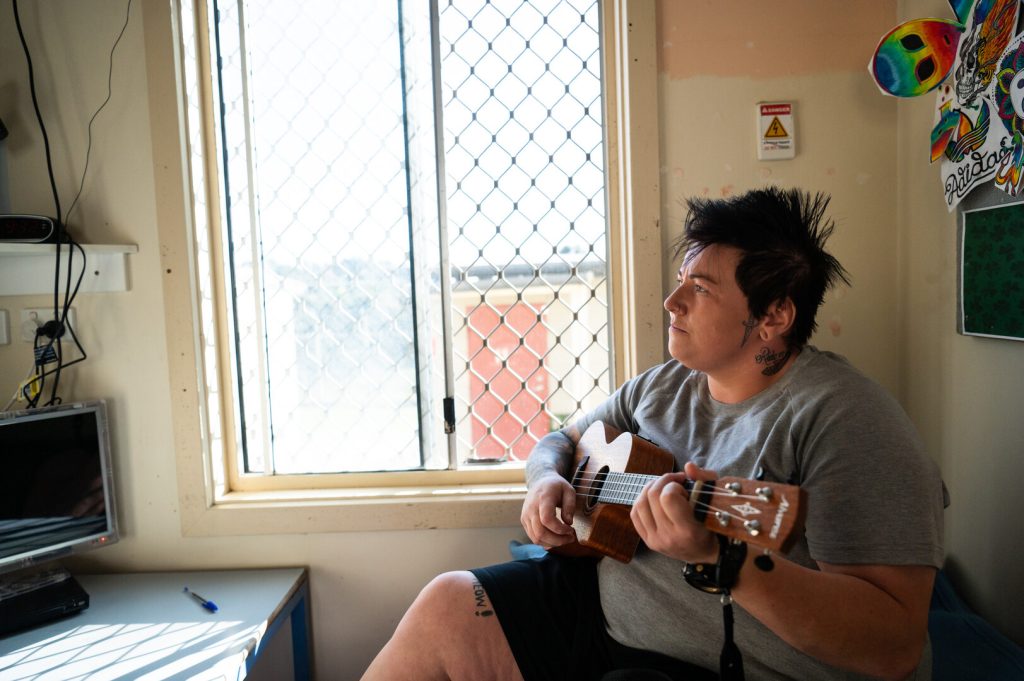
What’s next for the film?
SA: The film was commissioned by ABC, so it’ll be a feature there at the end of the year. There’s some other exciting festivals before then in the mix at the moment that we’re not allowed to announce yet!
What is so important to us around this film is the capacity to use it as a tool for social impact. We’ve been able to raise a pretty impressive social impact budget and we have big plans to highlight the issues that we show in the film. It’s about building programs to support women once they get outside.
Its also about reaching niche groups. We have a big screening event planned with all the magistrates of South Australia. Women will speak at the event about the issues of remand, so they can see the toll it takes. We can try to break down barriers, and help try and find other options to putting women in jail, when they then lose their home, and often lose their children.
One thing we’re really excited about is a partnership that we have brokered with Work Skill, which is about creating opportunities for women for employment once they get out. We’re doing a national screening tour with huge employers. They will all come together to view the film and they can sign up on the spot to open up vacancies designed specifically for women once they get out of prison.
What’s next on your horizon in terms of filmmaking?
SA: This project is definitely going to keep me consumed for at least the next 12 months, but as you know, you’ve got to have the next film in the wings waiting to come!
I’m exploring a few different ideas and thoughts at the moment and keeping a really open mind. Each film takes three to five years to come to fruition, so it’s got to be something that’s going to keep the passion alive for a very long time!
Did you go to film school and who were your film inspirations?
SA: I studied film at the at the university, South Australia. I finished my degree 26 years ago and I have been plugging away ever since. When I was in uni, I think the person I really admired was Jane Campion, because The Piano had just come out. I was very much on a path of wanting to direct features, and then just through life experiences and travelling, I had a complete U- turn and started working on documentaries and never looked back.
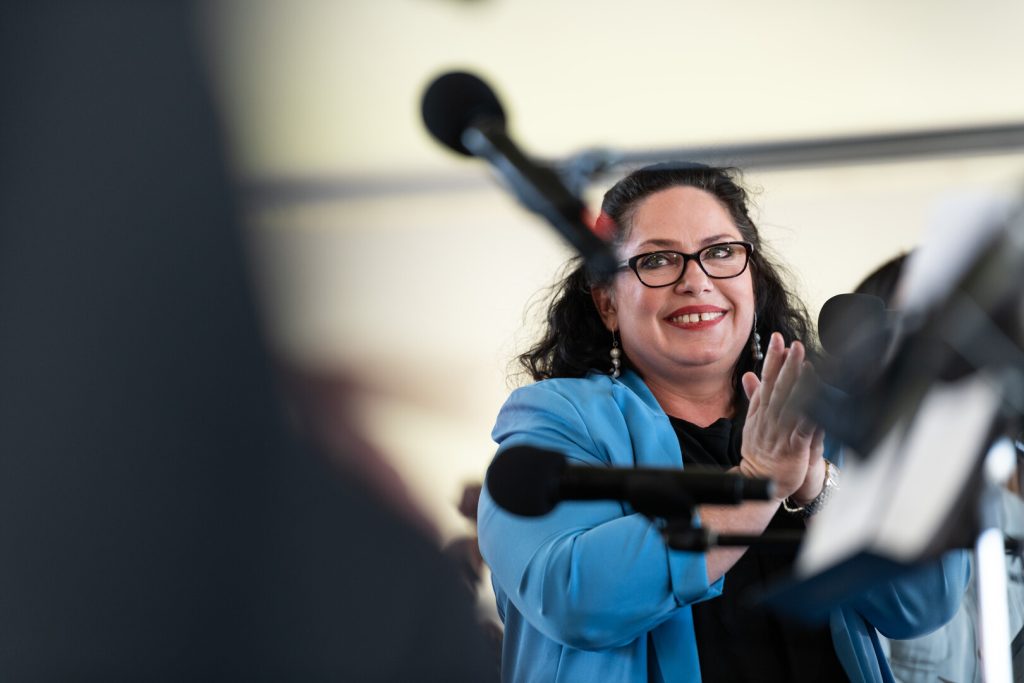
What advice would you give to someone starting out?
SA: Resilience is the key because it’s such a hard slog. There’s so much rejection along the way. You have to have a really thick skin. Roll with the punches and use the setbacks and the rejections as your superpower to just keep going. My mentality has always been: films have to be made – why can’t I be the one who makes them?
Was it a particular story that set you on the documentary path?
SA: I just went travelling after I had made quite a successful short film. Usual mid-20s, backpacking through Southeast Asia. I ended up meeting some kids from a hill tribe who were living on the streets in Vietnam. I had such an intense experience with these kids, and then was so determined to come back to this place in the mountains of north Vietnam to make a film about them. I came back to Australia, got a small grant from somewhere and then just became really obsessed. I ended up following them as they lived on the streets for five years, maxing out my credit card, backing myself and believing that it was something special. The Love Market (2009) ended up nominated for two AACTA awards, and won many other things. I was sucked in by the power of documentary.
Documentary filmmakers are often good at wearing lot of hats. How have you kept a separation between roles, or have you not?
SA: I think I’ve been quite purist in that I’ve always been a writer- director, and I always produce my own films to the point where I get them up and financed, and then I bring in a team of producers to run it from that point. I’ll often shoot all my own films as well, but that’s not because I feel like I’m good at it. I just do it by default because there’s no one else that can do it except me. I feel I can get the most intimate footage with people. I would never try and get work as a cinematographer, I just do it by default, and I wish I was better at it!
There’s been a few films about prisoners recently. Do you think its a thing at the moment?
SA: I think that there’s a feeling that prisons are everywhere on the streaming platforms particularly. I think that also comes from our obsession and that explosion around true crime. I like small, intimate stories that speak to a broader kind of social issue. Child protection in Australia is such a hot topic and something that’s only going to be becoming more of a conversation. I’m interested in issues around youth justice and the age of criminal responsibility being reduced in a couple of states to 10 years old, and what are the consequences for that ?

What did you learn about like yourself while making Songs Inside ?
SA: I find it easy to connect with women in general and I didn’t really feel like there was a separation between me and the prisoners. Everyone can find connection around being a mother, or having loss, or going through difficult times. I’m a very curious person, I cannot help asking anyone I sit next to on a bus or plane where they’re going! I like being able to turn something on its head – there’s someone who has committed a horrific crime, but to still find some humanity and have a conversation with them about them missing their daughter is something I find so interesting. I think being a mum in that space is a huge point of connection.
There’s a moment in the film when you see an act of mothering and one of the prisoners is referred to as Mother.
SA: For so many of the women involved in this project, even though I felt like they were my equal, I was actually old enough to be their mum! It’s very sad how young some of them are. They are all missing their kids, or missing a mother figure.




